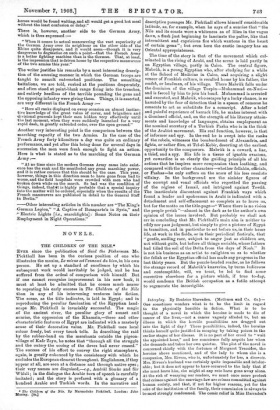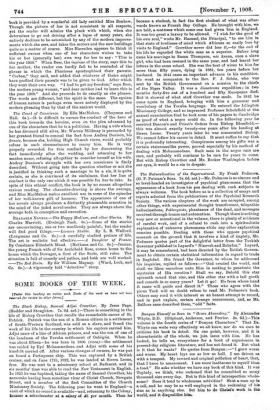Interplay. By Beatrice Harreden. (Methuen and Co. Os.)— One sometimes
wonders what is to be the limit in regard to the physically horrible in fiction. What is to be thought of a novel in which the heroine is made to die of cancer of the liver,—not a cancer vaguely alluded to, but an illness in which the horrific possibilities are dragged out into the light of day ? These possibilities, indeed, tho heroine thinks herself quite justified in escaping by taking poison in tke earlier stages of her disease. It is no part of her creed to "wait the appointed hour," and her conscience fully acquits her when she demands and takes her own quietus. The plot of the novel is concerned chiefly with the fortunes of Margaret Tressider, the heroine above mentioned, and of the lady to whom she is a companion, Mrs. Rivers, who is, unfortunately for her, a divorcee. Mrs. Rivers's husband was certainly quite impossible and intoler- able; but it does not appear to have occurred to the lady that if she must leave him, she might at any rate have gone away alone. At the risk of wearying our readers, we must once more protest that crimes against the marriage-law are crimes committed against human society, and that, if not for higher reasons, yet for the sake of the institution of the family, their commission is always to be most strongly condemned. The comic relief is Miss Harraden's book is provided by a wonderful old lady entitled Miss Benbow. Though the picture of her is not consistent in all respects, yet the reader will admire the pluck with which, when she determines to go out driving after a lapse of many years, she entirely declines to be astonished by any of the modern improve- ments which she sees, and takes the motors and the new buildings quite as a matter of course. Miss Harraden appears to think it sufficient excuse when one of her characters wishes to take his or her (generally her) own way for her to say: "This is the year 1908." When Bess, the ingenue of the story, says this to her mother, the reader can hardly fail to be reminded of the phrase in which the Pharisees apostrophised their parents. " Corban," they said, and added that whatever of theirs might have profited their parents was to be given to God. After which they went their own way. " I had to get my freedom," says Bess, the modern young woman, "and dear mother had to learn this is the year 1908." And she proceeds to do exactly as she pleases. The words are different, but the spirit is the same. The egoism of human nature is perhaps even more naively displayed by the modern phrasing than by that of the ancient world.





























































 Previous page
Previous page